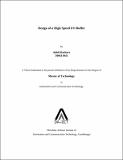Please use this identifier to cite or link to this item:
http://drsr.daiict.ac.in//handle/123456789/209| Title: | Design of a high speed I/O buffer |
| Authors: | Parikh, Chetan D. Rathore, Akhil |
| Keywords: | Memory management Computer science Bipolar transistors Metal oxide semiconductors Digital electronics Design Random access memory Electronic circuit design Electric current converters Computer architecture |
| Issue Date: | 2008 |
| Publisher: | Dhirubhai Ambani Institute of Information and Communication Technology |
| Citation: | Rathore, Akhil (2008). Design of a high speed I/O buffer. Dhirubhai Ambani Institute of Information and Communication Technology, ix, 33 p. (Acc.No: T00172) |
| Abstract: | In high speed serial transmission of data, output buffer creates the bottleneck. Current Mode Logic (CML) buffers have gained wide acceptance in most high speed serial interfaces as they reach speed of the order of Gbp/s. CML buffers achieves high speed due to low output voltage swing which reduces transition time. Presently CML buffers are designed with differential architecture and uses different bandwidth extension technique (inductive peaking, negative miller capacitance, active feedback) to increase the speed. At high frequency, input output coupling limits the bandwidth due to miller effect because of gate to drain capacitance. The proposed design incorporates the architecture which reduces miller effect, hence achieves high bandwidth. In this topology a source follower drives a common-gate stage which is an example of ‘unilateral’ amplifier, that is, one in which signal can flow only in one way over large bandwidths. It reduces unintended and undesired feedback. This CML buffer is designed for OC-192/STM-64 application to be used in limiting amplifier which is a critical block in optical system. OC-192/STM-64 works around 10Gbps. |
| URI: | http://drsr.daiict.ac.in/handle/123456789/209 |
| Appears in Collections: | M Tech Dissertations |
Files in This Item:
| File | Description | Size | Format | |
|---|---|---|---|---|
| 200611042.pdf Restricted Access | 1.32 MB | Adobe PDF |  View/Open Request a copy |
Items in DSpace are protected by copyright, with all rights reserved, unless otherwise indicated.
